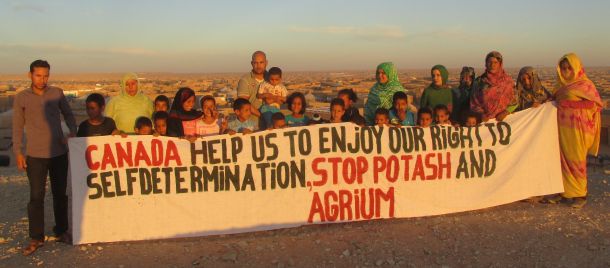
All Swedish government funds have now divested from Canadian company Agrium Inc, due to its phosphate imports from occupied Western Sahara. According to the fund's Ethical Council, Agrium cannot prove that the phosphate exploitation is done in accordance with the wishes and the interests of the Saharawi people.

"Agrium is well versed in the problems in Western Sahara, but believes that their phosphate purchases are in line with international and Canadian law. The Ethics Council does not believe that the company has been able to prove that phosphate mining is done in accordance with the Saharawi's interests and desires. The Ethical Council's assessment is that a continued dialogue is not meaningful and therefore recommended the Funds to dispose Agrium", the Swedish Ethical Council writes in its Annual Report of 2014, published 9 April 2015.
Agrium Inc is a Canadian fertilizer producer which started importing phosphates from occupied Western Sahara in 2013 on the basis of a contract with the Moroccan state-owned phosphate company OCP. Ever since Morocco's invasion of Western Sahara in 1975, OCP has been exploiting Western Sahara's phosphate rock reserves. Morocco's claims to Western Sahara have been rejected by the International Court of Justice and the United Nations still consider the territory to be a colony. As such, the exploitation of and trade in Western Sahara's resources are contrary to international law, as established with great clarity by a UN Legal Opinion of 2002. That Legal Opinion concluded that the mineral resource exploration or exploitation in Western Sahara could only be lawful if it was done in line with the interests and the wishes of the peope of the territory, the Saharawi people.
"The Ethical Council, together with other investors, complained to the company that they have not been able to prove that the purchase of phosphate are in accordance with Western Sahara's interests and preferences. But we failed to convince the company of that stance. In this case, the Ethical Council recommends the sale of its shares in the company", the annual report says.
The Swedish AP pension fund is comprised of several sub-funds, over fears that one large scheme would become too dominant an investor in Sweden. Today, the AP Fund consists of five smaller funds: the first, the second, the third, the fourth and the seventh AP Fund. The fifth and sixth AP fund have been disbanded.
WSRW reported in December last year that one of those sub-funds, the seventh AP fund, had divested from Agrium. The other sub-funds have now followed suit.
Wave of investors blacklist Nutrien over Western Sahara controversy
More and more investors are kicking Nutrien from their portfolios for its imports of phosphate from occupied Western Sahara. But the company shows no indication of its stated intent to phase-out the controversial imports from by the end of this year.
Swedish bank excludes phosphates industry in Western Sahara
Wave of divestments over Western Sahara
US Methodist Church blacklists five companies active in Western Sahara
In December 2015, the US United Methodist Church announced it had divested from 39 companies. Five of those are involved in occupied Western Sahara.



